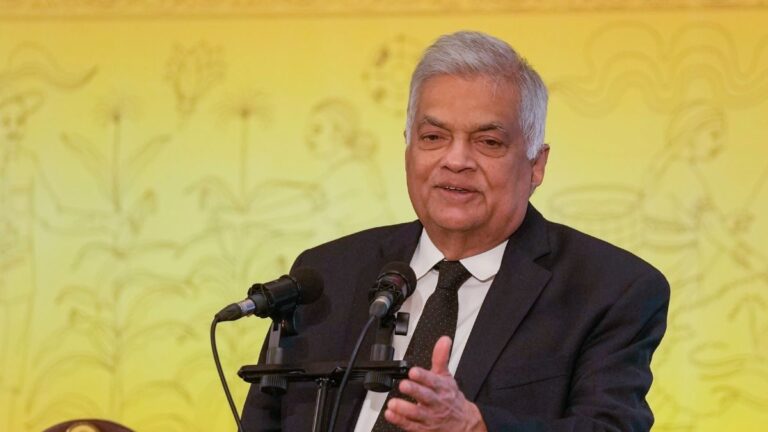Sri Lankan President Ranil Wickremesinghe failed on Monday to secure the support of the largest party in parliament for re-election, posing a major challenge to his prospects in the Sept. 21 vote.
About 17 million of Sri Lanka’s 22 million people are eligible to vote in the crucial election that will determine the future of reforms in the South Asian island nation which is suffering from its worst financial crisis in decades.
Among the various candidates, Wickremesinghe is seen as the most market- and reform-friendly choice. He took office in July 2022 as the economy collapsed during a severe financial crisis sparked by a record shortfall in foreign exchange reserves.
But with just one seat up for grabs in parliament, to be a stronger candidate he would need the support of the Sri Lanka People’s Party (SLPP), which holds a majority in parliament and includes former president Mahinda Rajapaksa and his brother as key members.
While the SLPP’s decision is a blow to Wickremesinghe, he is running as an independent and breakaway factions of the SLPP and other opposition parties may support him, so it does not mean he is out of the race completely.
“The Politburo has decided by a majority that the Sri Lanka People’s Party will field candidates under the SLPP party symbol,” SLPP general secretary Salaga Kariyawasam told reporters after the party’s Politburo meeting.
Kariyawasam added that the SLPP candidate is expected to be announced within the next few days.
There was no immediate comment from Prime Minister Wickremesinghe or his office on the SLPP’s decision.
A source from Wickremesinghe’s United National Party said the result was expected.
“We still expect a group of SLPP lawmakers to support President Wickremesinghe and the minority party lawmakers,” a source with direct knowledge of the matter said. “This will allow us to build a broader coalition that cuts across different party and ethnic lines.”
Wickremesinghe’s predecessor, Gotabaya Rajapaksa, became the first sitting president to be ousted from power after thousands of disgruntled protesters seized the presidential office and official residence, forcing him to flee the country and subsequently resign.
President Wickremesinghe has overseen a fragile economic recovery over the past two years, securing a $2.9 billion bailout program from the International Monetary Fund to halt the rupee’s decline, tame soaring inflation and rebuild dollar reserves.
Prime Minister Wickremesinghe also laid the groundwork for Sri Lanka to begin debt restructuring negotiations with official creditors and bondholders.
But the pain from the financial crisis is far from over. Under the IMF plan, Sri Lanka needs to raise tax revenues, turn around loss-making state enterprises and complete a $12.5 billion debt restructuring with bondholders.
Rising poverty, corruption and policy gridlock were also concerns, analysts said, adding that the crisis could erode the SLPP’s strong support base, making the outcome of any coalition government with Wickremesinghe unpredictable.
Top Videos
Show all
Quad condemns ‘threatening behaviour’ in China-Philippines clash, Beijing hits back
Venezuela polls see opposition claim victory as President Maduro calls for ‘iron fist’ to crush dissent
Israel approves Hezbollah attacks after Golan Heights attack, drawing Lebanon’s European and Arab allies closer
“Good luck to Macron…” Russia sarcastically replies to revocation of journalist accreditation for the Paris Olympics
Netanyahu calls for a “NATO-like” Middle East bloc: Will the “Iranian threat” unite Israel and Arab countries? | #CV
“The public is quietly waiting for election day to make a decision,” said political scientist Professor Jayadeva Uyangoda.
“It’s umpire time for Sri Lanka.”
(This story has not been edited by News18 staff and is published from a syndicated news agency feed (Reuters))
Location: Colombo, Sri Lanka
First revealed: 29 July 2024 20:16 IST

